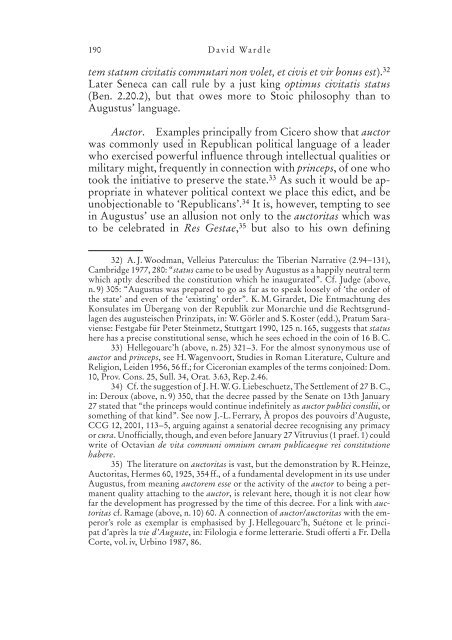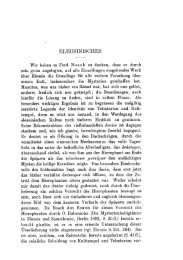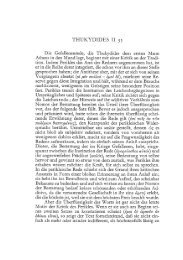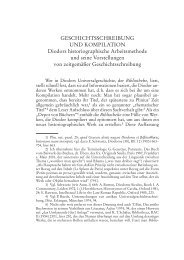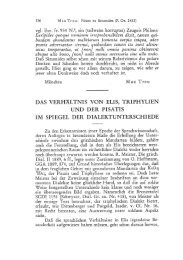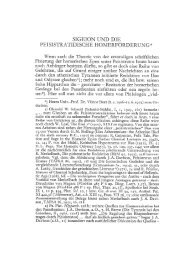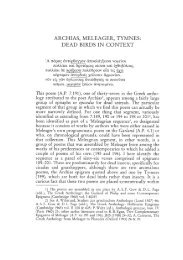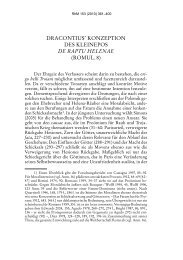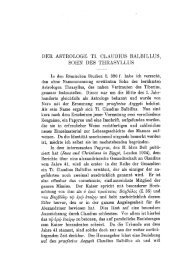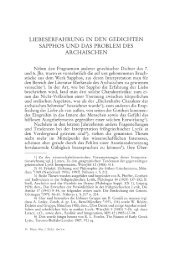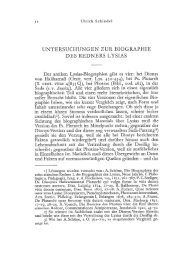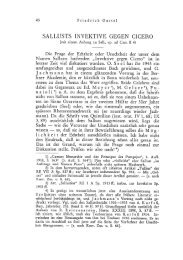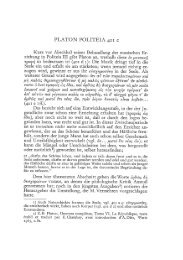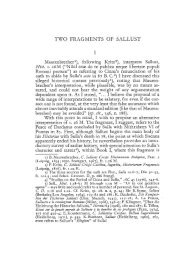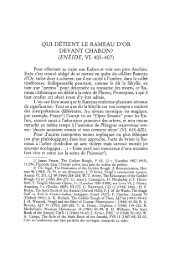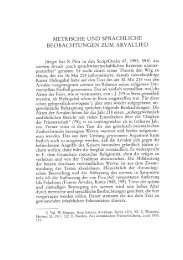VIRGILIO E STESICORO Una ricerca sulla Tabula Iliaca Capitolina *
VIRGILIO E STESICORO Una ricerca sulla Tabula Iliaca Capitolina *
VIRGILIO E STESICORO Una ricerca sulla Tabula Iliaca Capitolina *
Sie wollen auch ein ePaper? Erhöhen Sie die Reichweite Ihrer Titel.
YUMPU macht aus Druck-PDFs automatisch weboptimierte ePaper, die Google liebt.
190 David Wardle<br />
tem statum civitatis commutari non volet, et civis et vir bonus est). 32<br />
Later Seneca can call rule by a just king optimus civitatis status<br />
(Ben. 2.20.2), but that owes more to Stoic philosophy than to<br />
Augustus’ language.<br />
Auctor. Examples principally from Cicero show that auctor<br />
was commonly used in Republican political language of a leader<br />
who exercised powerful influence through intellectual qualities or<br />
military might, frequently in connection with princeps, of one who<br />
took the initiative to preserve the state. 33 As such it would be appropriate<br />
in whatever political context we place this edict, and be<br />
unobjectionable to ‘Republicans’. 34 It is, however, tempting to see<br />
in Augustus’ use an allusion not only to the auctoritas which was<br />
to be celebrated in Res Gestae, 35 but also to his own defining<br />
32) A. J. Woodman, Velleius Paterculus: the Tiberian Narrative (2.94–131),<br />
Cambridge 1977, 280: “status came to be used by Augustus as a happily neutral term<br />
which aptly described the constitution which he inaugurated”. Cf. Judge (above,<br />
n. 9) 305: “Augustus was prepared to go as far as to speak loosely of ‘the order of<br />
the state’ and even of the ‘existing’ order”. K. M. Girardet, Die Entmachtung des<br />
Konsulates im Übergang von der Republik zur Monarchie und die Rechtsgrundlagen<br />
des augusteischen Prinzipats, in: W. Görler and S. Koster (edd.), Pratum Saraviense:<br />
Festgabe für Peter Steinmetz, Stuttgart 1990, 125 n. 165, suggests that status<br />
here has a precise constitutional sense, which he sees echoed in the coin of 16 B. C.<br />
33) Hellegouarc’h (above, n. 25) 321–3. For the almost synonymous use of<br />
auctor and princeps, see H. Wagenvoort, Studies in Roman Literature, Culture and<br />
Religion, Leiden 1956, 56 ff.; for Ciceronian examples of the terms conjoined: Dom.<br />
10, Prov. Cons. 25, Sull. 34, Orat. 3.63, Rep. 2.46.<br />
34) Cf. the suggestion of J. H. W. G. Liebeschuetz, The Settlement of 27 B. C.,<br />
in: Deroux (above, n. 9) 350, that the decree passed by the Senate on 13th January<br />
27 stated that “the princeps would continue indefinitely as auctor publici consilii, or<br />
something of that kind”. See now J.-L. Ferrary, À propos des pouvoirs d’Auguste,<br />
CCG 12, 2001, 113–5, arguing against a senatorial decree recognising any primacy<br />
or cura. Unofficially, though, and even before January 27 Vitruvius (1 praef. 1) could<br />
write of Octavian de vita communi omnium curam publicaeque rei constitutione<br />
habere.<br />
35) The literature on auctoritas is vast, but the demonstration by R. Heinze,<br />
Auctoritas, Hermes 60, 1925, 354 ff., of a fundamental development in its use under<br />
Augustus, from meaning auctorem esse or the activity of the auctor to being a permanent<br />
quality attaching to the auctor, is relevant here, though it is not clear how<br />
far the development has progressed by the time of this decree. For a link with auctoritas<br />
cf. Ramage (above, n. 10) 60. A connection of auctor/auctoritas with the emperor’s<br />
role as exemplar is emphasised by J. Hellegouarc’h, Suétone et le principat<br />
d’après la vie d’Auguste, in: Filologia e forme letterarie. Studi offerti a Fr. Della<br />
Corte, vol. iv, Urbino 1987, 86.


